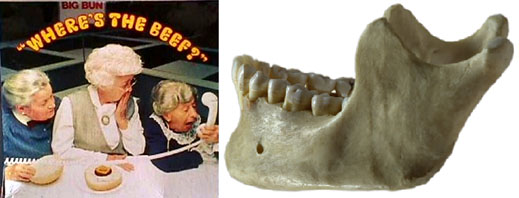
By John Helmer in Moscow
Time to remember the famous advertisement of Wendy’s, the American burger chain, which contrasted the substance of its product with the paltriness of its rivals. So now let’s ask the biggest unanswered question in Russian political economy — what happened to the stimulus funding the Russian government was supposed to have, and promised to have available a year ago, in the event that a global collapse of demand for steel left Russia’s steel industry dependent on domestic demand, instead of exports?
Not a single owner of a major Russian steel or pipemill, who attended last Friday’s summit meeting with the government, dared to wonder aloud. And there’s not a trace of an answer in the morning-after reports of what was said at the session. Instead, the major steelmakers, who met with Prime Minister Vladimir Putin in Magnitogorsk on Friday, refuse to say whether they believe the government intends to implement their requests for state financial support. In addition to representatives of the steel and pipe mills, the largest of Russia’s steel consumers such as Gazprom, the Transneft pipeline company, and the Russian Railways (RZD) also attended.
Putin and the other government officials at the meeting indicated they support a Russian variant of the “Buy American Steel” programme. But it’s unclear how they can do it without making Russia’s trade relations with export markets the steelmakers depend on worse than they are already. The sensitivity of the Chinese government to any move Moscow to block Chinese imports arouses the apprehension of Russian steel exporters to China of retaliatory trade measures.
The government said at the summit meeting that the railways may receive a $1.6 billion subsidy to stimulate more steel purchasing. However, a request officials appeared to back from steelmakers, requesting a cut in the rail tariff for scrap deliveries to the mills, produced a hostile reaction from Vladimir Yakunin, chief executive of RZD. If the rate cut were implemented, he said RZD would lose Rb4.5 billion ($145 million) in revenue per year, which he then threatened to take out of steel procurement from the mills. “For us, [the rate cut] means refusal of major repairs of 1400 kilometres of railway or the decrease in purchase of 255,000 tonnes of steel products.”
Although pipemaker TMK’s chief executive and proprietor Dmitry Pumpyansky requested import duties on pipes and cheaper credit from state banks, Gazprom and Transneft replied that the pipe manufacturing capacity to meet their requirements is still insufficient in Russia, and imports are necessary.
Among the financial aid measures tabled for discussion, refunding delays for value-added tax (VAT) paid on exports of steel may be cut from 90 days to 20 days. A Rb45 billion bond issue ($1.5 billion) by Mechel to cover the cost of developing its fareastern Elgaugol coking-coal deposits is likely to be arranged by state banks, and repayment guarantees for half the amount may be issued by the state. Since Mechel owner Igor Zyuzin was the target of Putin’s direct attack at the last steel summit, a year ago — he accused Zyuzin of absenting himself because he was guilty of price-rigging and price gouging for coking-coal — the positive gesture in Mechel’s direction is interpreted in the industry and among Mechel’s banks as reassuring. A report by Barry Ehrlich, steel analyst for the Alfa Bank group, says: “The bond issue will help Mechel solve its short-term liquidity problems; the government’s decision to provide the guarantees may mean that the company has finally resolved all its issues with the state; the company is certain to keep the license for Elga.”
The steelmakers also requested at the meeting a reduction of state bank loan rates, and the rebate of interest payments already made above an undefined interest-rate threshold. No commitment or decision was given. Also, no specific new measures from the government to increase support for automakers and the construction industry were mentioned. “We see the news as neutral to slightly positive at present, as the potential measures are still in the early stages, while finalization and implementation might take considerable time,” reports George Buzhenitsa of Unicredit Securities in Moscow.”